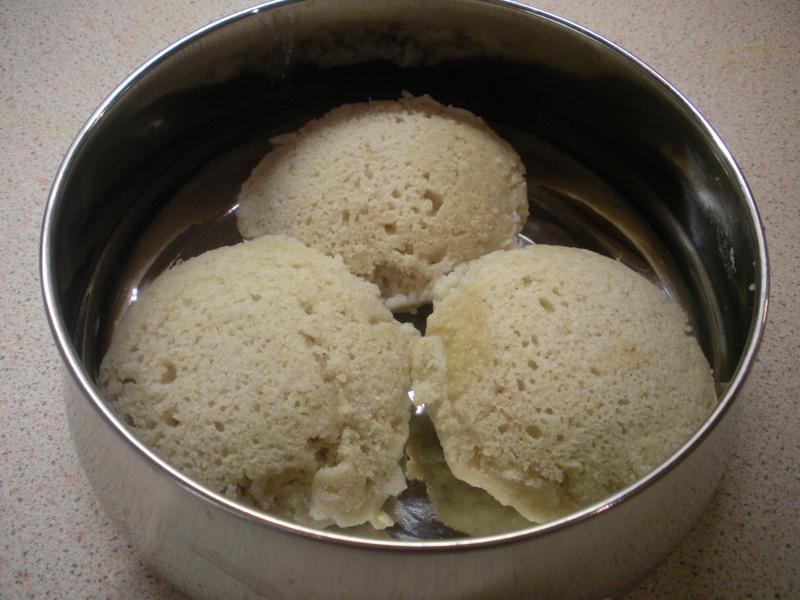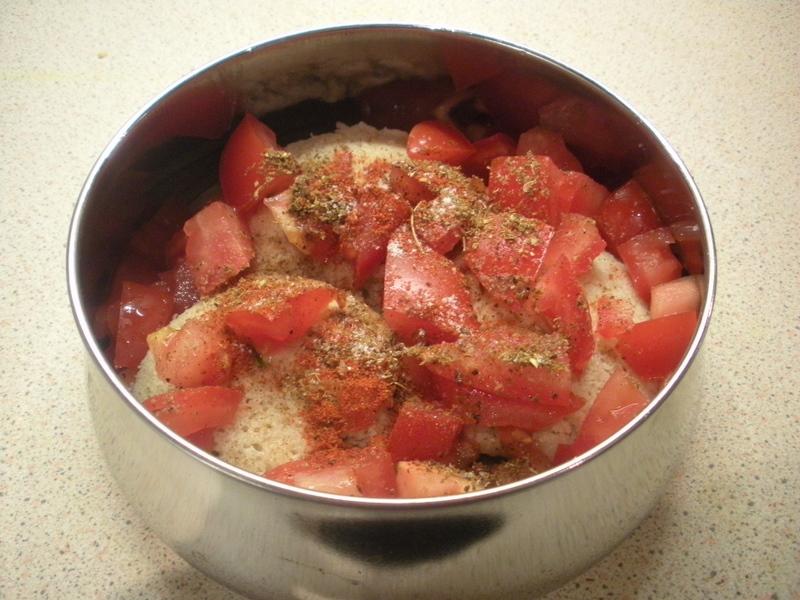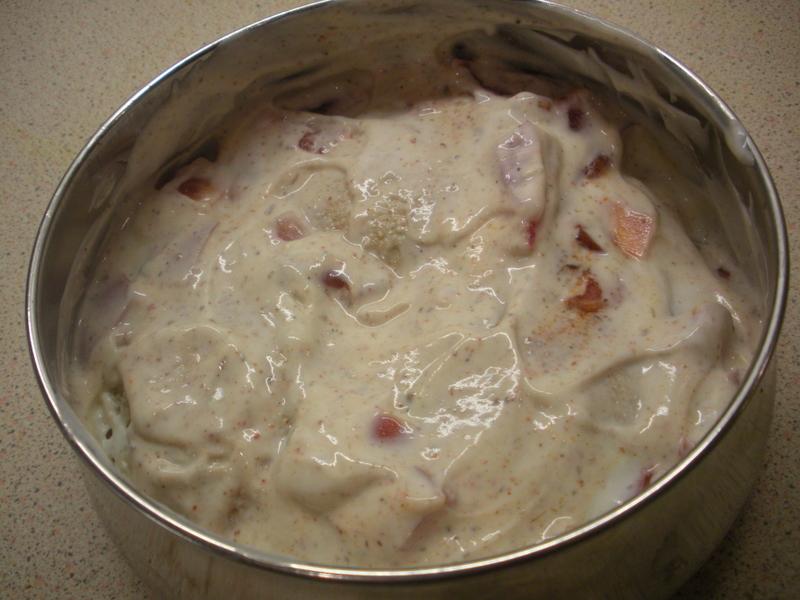
Jenni
participating member-
Posts
1,040 -
Joined
-
Last visited
Content Type
Profiles
Forums
Store
Help Articles
Everything posted by Jenni
-
Sadly, that recipe calls for tamcon, which I fully believe should be banned! It does not have the correct tamarind flavour!
-
I used to hate olives, like really really hate olives. I could smell a jar or packet of olives being opened in the kitchen when I was upstairs and it would make me feel ill. But, I made myself like them. What I did was eat one or more olives every day for a period of two-three weeks. At first it was excruciating and I had to eat them mixed in with other things. After about ten days, I noticed that I was no longer repulsed by them. I didn't like the taste, but I didn't hate it either. By about two and a half weeks, I was actually looking forward to my daily olive, and I now really enjoy eating olives. I really believe that repeated exposure is the key. There is nothing that you can't make yourself like with practice!
-
Broccoli stems have always reminded me of kohlrabi. I like them in stews or dishes with lots of sauce, especially tomato.
-
I think it's more than intensity - dried herbs have quite a different flavour. Compare dried and fresh mint. I don't think they are interchangeable.
-
I like lemon juice, black pepper and ground nutmeg add at the table. I think if you cook these things into the dish, it has a completely different flavour. Could ghee also be counted? A dab of ghee on top of a steaming plate of khichari is divine, to say nothing of its effect on a fresh chapati.
-
Well, I've not ever heard idlis being refered to as pastries! Anyway, I'm not really sure what you mean by americanized. Have a look on one of the many blogs run by those who are South Indian or of South Indian descent and I'm sure you will find a good recipe. The key thing to remember is that sambar is made with variations all over South Indian. Some use coconut in the sambar powder and some don't; some add a little bit of jaggery to the sambar whilst some don't, and so on. So, there is room for a few differences between recipes. As a rough guide to making sambar, here are the main points. Cook toor dal with a little turmeric and water. When cooked, add whatever vegetables you fancy (I recommend drumsticks), sambar powder and tamarind paste. Don't use pre-made tamarind paste. You will get so much more flavour by soaking dried tamarind in hot water and squeezing out as much paste/ tamarind water as possible. If you like, you can add a little bit of jaggery, but this is optional and does not appear in all sambars. When vegetables are done and tamarind has lost its raw taste, turn off heat. Finally, make a tadka of mustard seeds, cumin, fenugreek seeds, a little asafetida, dried red chillies and curry leaves. When mustard seeds have popped and fenugreek is a shade darker (not too dark, or it will be bitter), add to sambar. I like a little fresh coriander in my sambar, right before serving. Sambar can contain lots of vegetables, or just one kind. Sometimes the vegetables are fried a little before they are added to the toor dal, especially the little onions that are added to sambar whole. Good veggies for sambar are mooli, carrot, green beans, drumsticks, okra, aubergine, small whole onions, tomato...you get the idea. Sambar should not be too thick, but it is thicker than rasam. Here is a great recipe for sambar powder. You will notice that this sambar powder does not contain coconut, though some do. You can also buy reasonable sambar powder from most Indian grocery stores, if you don't want to make it fresh. I tend to make a big batch of sambar powder, as I use it up quite quickly. Some sambar recipes don't call for a pre-made powder, but for a spice paste that you make fresh for the sambar. These often contain coconut. I hope this is enough to be going on with. Remember that sambar is a versatile dish that goes well with rice and dosas as well as idlis and vada. Happy cooking!
-
Is it another topic? I think the two are, unfortunately, somewhat intertwined. Because of the limited shelf life of ww flour, unless you grind the berries yourself or know someone that does, it's almost impossible to find a batch that doesn't have rancid oils. Since humans are hard wired to avoid rotten food because it's bad for us, the only way to make ww flour palatable is by hiding the bitter rancidity with sugar- a LOT of sugar. Sure, you can make a whole wheat bread without any sweetener, but I wouldn't feed it to my dog. And, speaking of dogs... dogs, unlike humans, ARE able to process rotten food without ill effects. You know the nauseating feeling you get when you walk down the dog food aisle? That's nature's way of keeping you (and your ancestors) alive. You should listen to that same voice in your head when presented with 'supposedly' healthy whole wheat options. Healthy food shouldn't require sugar to make it less repulsive. If you're movement towards whole grains is for health reasons, I would definitely rethink the ww angle. Unless, as I said, you're planning on grinding the berries yourself. Freshly ground wheat- now THAT's healthy. Otherwise, reach for the oatmeal. Or, better yet, reach for the broccoli. Although what you say about whole wheat flour going rancid more easily and quickly is true, I think you are over-reacting. It doesn't mean that all wholewheat flour you buy is going to be rancid. I pretty much only use whole grain flours, and although I often grind the grains myself, I also buy a lot. I have never, ever bought wholewheat flour that was rancid. You may have had some bad experiences, but there's no need to try and scare others off from trying something new.
-
Ok, first of all, I really hope that mouse was on a low-iodine diet, because otherwise he's got some serious explaining to do! On a (slightly) more serious note, you are allowed potatoes without the skins, no? In which case, a steaming pile of mashed potato is called for. You don't have to use butter - in Bengal mashed potatoes are flavoured with mustard oil and chillies and I believe in Greece olive oil is used. I see no mention of olive oil (or mustard oil) not being allowed...What could be more comforting than some lovely, fluffy, spuddy goodness?
-
Reading this story, I was wondering whether the lady had gone for a potential allergens test and had mistakenly thought the list of possible intolerances that she tested for were actual allergies. Quite a few years back, my Dad went for one of these tests (can't remember why now) and came back with an enormous list of things to try and avoid. They weren't actual allergies, just things that apparently his body may be intolerant too. Supposedly it wasn't just a random list of well-known allergens either (though it read like one), because he had to do blood tests and all sorts and they printed out the list at the end. The funny thing is, it seemed like they had picked as many as his favourite foods as possible! After about a week of half-arsedly avoiding them, he decided that, even it was true that his body didn't like garlic, chillies, tomato, potato, dairy, wheat, gluten, etc. he certainly didn't like giving them up. He's still with us
-
Haven't been on egullet in such a long time, and certainly haven't visited this thread for a while, so I felt the need to share a recent lunch. What could be better to find in a lunch box than three light, spongy idlis, coated in spicy yoghurt? I didn't take a photo, but luckily I have made this particular lunch before, so I have some old photos (I may have posted these before, though I don't remember doing so) Freshly made idlis (made with brown rice), waiting to be bathed in yoghurt. First however comes chopped tomato, chilli powder, roasted and ground cumin and coriander, black pepper and salt. The idlis are well covered now, but they are lying in wait, and getting juicier by the moment as they suck up some of the yoghurt.
-
My favourite breakfasts are upma or idli-sambar. Wouldn't say no to a paratha though! I cannot stand sweet breakfasts. Generally I prefer savoury over sweet anyway, but I especially cannot abide sweet things early in the morning.
-
So you can make idli and vada but not sambar? Interesting. Do you mean that you do not know how to make sambar at all, or are you just having trouble getting the taste right? Because a quick google will draw you up many sambar recipes, and many Indian cookbooks these days have a sambar recipe too. I'm sure you know the basics - boil toor dal, soak dried tamarind in hot water, etc. Or are you not looking for a recipe for the whole dish sambar, but for the sambar powder itself?
-
Or add the solids to some freshly cooked rice...
-
I have never kept idli batter for more than two days, the idlis just get eaten in my house! I don't know if you can keep it longer, but a good way of using up leftover idli batter is to make utthappam.
-
I love greens, and can't live without them. A great way with spring greens is stirfried with a tadka of cumin, ajwain, dried red chillies and asafetida. A little garlic is also really good in this.
-
I'm in the UK, and in my family we use these words for meals: Breakfast - obvious Dinner - the main meal of the day, whether midday or evening Lunch - the midday meal if it is not the main meal of the day Tea - A light snacky meal in the afternoon OR the kids last meal of the day (since kids generally eat earlier and lighter) OR an early, light evening meal of foods such as sandwhiches and other cold things. Supper - a light snack before bed or a light meal late in the evening
-
Millet. It's one of those grains that just isn't used enough...except in my house
-
I feel sure that you must be able to get them in some places in the US. They are easily available at Indian stores in my area of the UK. If you do manage to find them, buy them immediately and make sambar with them...mmmm....
-
^^^ I wasn't going to use them until I definitely knew anyway. It's just that there are some "for external use only" things which I have found to be mere overprecaution - I am talking in particular here about the pure mustard oil that in this country always seems to carry such a warning. I did once know the reason behind this, but can't remember now. It was something to with using mustard oil full stop, I think, not the particular brand of oil, and such things are easily shown to be nonsense with a quick look at how many Bengalis have died of eating mustard oil. Anyway, I know several restaurants and families who use it in their cooking quite happily. I wanted to know if the essential oil situation was over-precaution or genuine danger.
-
Full English/Irish/Scottish/Welsh Breakfast
Jenni replied to a topic in United Kingdom & Ireland: Cooking & Baking
Old thread, but it bears reviving. I can't believe the attitude towards baked beans in this thread! Why, beans on toast with some mushrooms on the side (bacon as well for the non-veggies) is a minature English brekkie any day! -
The cafe at my college uses hot milk and water mixed with chocolate syrup. Personally I think it's ghastly - far too sweet. When I make hot chocolate at home, I just pour hot milk over chocolate pieces. It melts in just a few seconds. If you grated the chocolate it would practically be instant. Keeps the flavours natural and simple too - no messing about preparing syurps and whatnot. Any reason you couldn't stick to that? You could grate chocolate in advance and keep it in a jar, and there's plenty of milk-heating devices around that are used for coffee.
-
This is probably a very stupid question, but how important it is to use essential oils that are produced specifically for eating? I have some that I use for making all-natural face creams - would it be very dangerous to use these in cooking? Is it because the oils may not be organic and thus would be high in pesticides, or is it because of the way they are processed into oils?
-
This may not be particularly traditional, but I far prefer mince pies with puff pastry casing. I find them lighter and more appetising.
-
In the UK I'm pretty sure that minumum wage is minimum wage - so I don't worry about making waitstaff forfeit their pay. Anyway, certainly two places that I have waitressed at have put the tips in a jar and split them amongst ALL the staff, waitstaff and kitchen staff alike. Bottom line is, if service is bad I will not leave a tip, and I will make it clear (though not rudely) to the staff that things were not good.
-
Currently addicted to tapioca chips. Am completely incapable of stopping at one.



